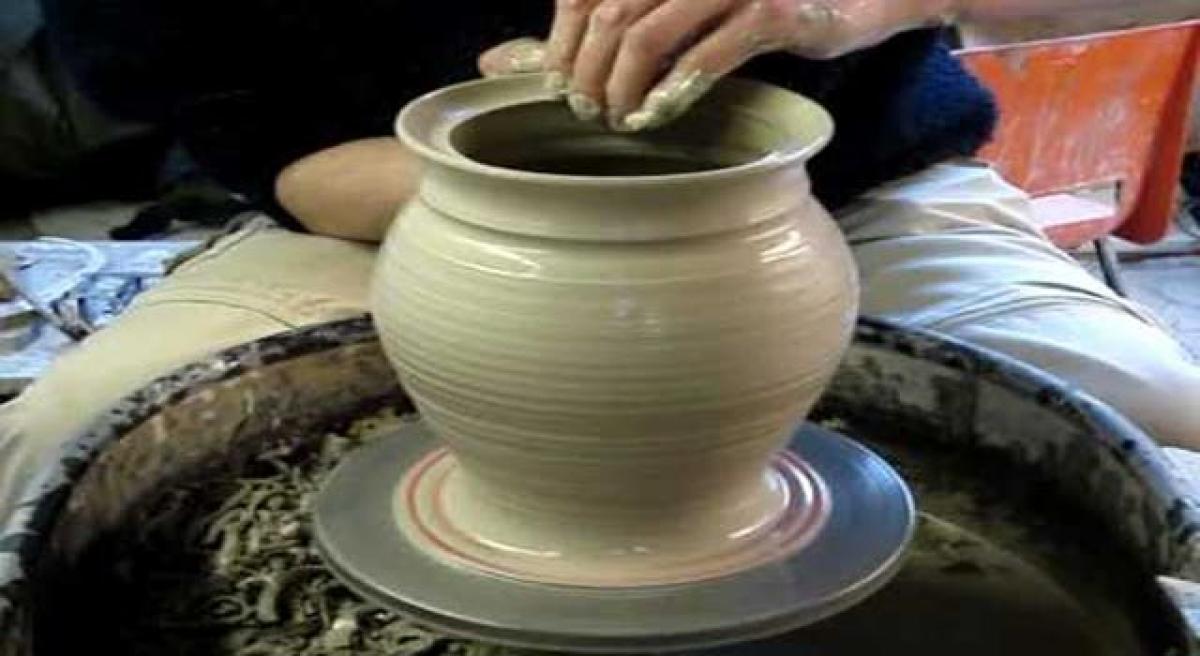Live
- 12-yr-old dies of electrocution
- Installation of smart meters opposed
- State Cabinet expansion in focus as CM leaves for Delhi
- Need to reintroduce country’s forgotten pride: Bhagwat
- Pant shatters Iyer's IPL auction record, sold to Super Giants for Rs 27 cr
- Yuva Sangeetha Sammelanam held
- Dharani proves a bane for 25K families across State
- Reckless, Dangerous Arms Race
- Russia needs a peace deal as it is running out of soldiers
- MyVoice: Views of our readers 25th November 2024
Just In

Summer is here and the upper class people are busy getting their air conditioners fixed and refrigerators repaired. But the lesser mortals, who cannot afford high-end household appliances, are going the nature’s way. They are taking home their earthen pots to cool the water during summer days.
Adilabad: Summer is here and the upper class people are busy getting their air conditioners fixed and refrigerators repaired. But the lesser mortals, who cannot afford high-end household appliances, are going the nature’s way. They are taking home their earthen pots to cool the water during summer days.
And, here in Adilabad, locally made ‘Ranjans’ (mud pots) are famous across the country as the poor man’s branded fridge, which believed to have a specialty of cooling water faster than other pots sold elsewhere.
Not surprisingly, the Ranjan pots manufactured by Kummara community in Adilabad, Utnoor, Ichoda and Gudihatnur mandals are being sold elsewhere in Andhra Pradesh, Telangana, Maharashtra, Madhya Pradesh and Chhattisgarh due to heavy demand. Most of the pots made in Adilabad are made of red soil.
However, not every red soil is suitable for making the pots. It is chosen from select streams, potter Latchaiah told The Hans India. Another potter, Lakshmaiah, said care was taken to keep out stones.
To make the water to cool faster, a mix of horse dung and ash is mixed with red soil. Later, the balls of soaked mix are made into pots. After drying the pots, they are burnt in kilns (battis) and painted with natural ‘jaju’ colour, according to Mahalakshmi, a potter. To lure customers, the pot makers are arranging taps to the pots for their convenience.
It is not an easy task to make Ranjans as it requires an artistic bent of mind. Its price is a plus point as it is welcomed with open arms by both the middle class and the poor. The price varies on the basis of quality of pots.
Most of the people who use Ranjans said that drinking water from them was healthy, as against the ill-effects of consuming items stored in refrigerators, which also harm the environment. Its effect was extremely cool, said Naveen, a local. Experts say that these pots are eco-friendly and are biodegradable. But sadly, these pot-makers are a struggling lot.
They spend thousands of rupees to give shape to the pots during a span of three months which is not remunerative. Setting up of a furnace (batti) costs at least Rs 25,000. Many lose heavily as they can’t recover the investment.
Hence, they want the government to arrange loans, as they have to remain idle during the rest of the year, Padma, a potter, told THI. She said most of the Kummari community members were poor.
They do not have houses. She appealed to the government to build two-bedroom houses for them. Residents of the towns in the district where these pots are made appeal to the government to accord a special recognition to these potters by initiating certain steps.
By Thotla Chinna Anjaiah

© 2024 Hyderabad Media House Limited/The Hans India. All rights reserved. Powered by hocalwire.com







